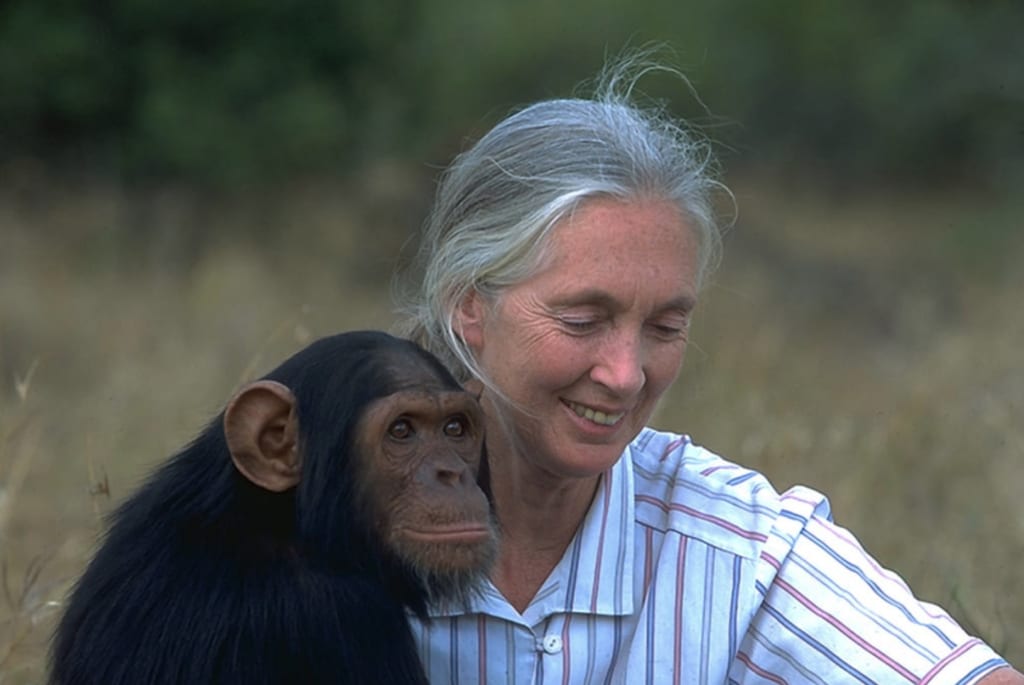In Praise of Jane Goodall
Jane Goodall has won the 2021 Templeton Prize. And that makes me happy.

Jane Goodall has won the 2021 Templeton Prize.
And that makes me happy. Goodall has been a hero of mine since I was a young child. The Templeton Prize is big stuff.
‘So what?’ you’re probably thinking. Prizes are a dime-a-dozen these days, and Goodall, 87, has won countless accolades since her pioneering studies of chimpanzee behavior in the 1960s changed the way we think about nature and the natural world.
Fact is, Goodall cares more about the environment and how we collectively need to change our habits if we’re to leave any kind lasting legacy for our children and grandchildren. The climate emergency is real, and growing, and it’s not going away any time soon. We need to eat less meat, if not eliminate from our diet entirely. We need to cut our use of single-use plastics, if not get rid of them altogether. We need to be better stewards of the natural world our parents and grandparents gave us, if we’re to leave anything of lasting value behind us when we leave this world.
So what makes the Templeton Prize any different?
Well … past winners include the Dalai Lama and Archbishop Desmond Tutu, for one. Aside from the Nobel Peace Prize, it’s hard to think of a more prominent, prestigious, high-profile honor, and the Templeton Prize has so far avoided the scandals and controversy that have dogged the Nobel Prize in recent years.
The Templeton also comes with $1.5m USD in prize money, money Goodall has vowed, “will make a huge difference to our programs around the world.”
And that’s the point.
As she lives out the remainder of her own twilight years, Goodall has become a tireless advocate — she prefers the label “advocate” to “activist” — for not just nature and wild animals, but for the people who live in communities where climate change and species extinction threaten their very existence. She spends her time fundraising and public speaking, on Zoom and in online forums and science conferences during the Covid pandemic, on behalf of her foundation, the Jane Goodall Institute. The Institute is dedicated to improving the lives of local communities in rural Tanzania, near where Goodall conducted her pioneering studies at Gombe Stream National Park in Central Africa’s great lakes region; creating sanctuaries for abused chimpanzees and gorillas, and providing safe habitats for primates to survive in the wild; and encouraging and inspiring children and students around the world through her Roots and Shoots educational programs, now in more than 60 countries.
The Templeton Prize, named for late investment fund manager and philanthropist John Templeton, acknowledges people who harness the power of science to shed light on the burning issues of the day, by answering questions about the universe, humanity’s purpose and our reason for being. Goodall was cited not only for her work in the field but for her “humility, spiritual curiosity and discovery.”
“(Goodall’s) discoveries have profoundly altered the world’s view of animal intelligence and enriched our understanding of humanity in a way that is both humbling and exalting,” Foundation president Heather Templeton Dill said in a statement on the foundation website.
Goodall for her part, far from being jaded about the accolade, said she was “humbled and overawed.”
Those who know her work — and I’ve been a fan and an admirer my entire adult life — might say it’s the other way around, but that’s not how she thinks. That’s where the “humility” part comes in.
Despite the Covid-19 lockdowns, the climate emergency has not gone away. If anything, as the developed world emerges from 15 months of forced inactivity, consumer spending, overconsumption and fossil-fuel use is likely to spike to unprecedented levels. Despite empty words and even emptier promises from world leaders, the climate emergency is likely to get worse, not better, as we collectively fly more, consume more and do more to drain Earth of its natural resources.
It’s for that reason Goodall spent much of the past 15 months as “Virtual Jane,” attending virtual conferences, answering emails and launching a podcast. She says she has been busier than at any time during her life. It has been exhausting, she admitted in a recent interview in the UK Guardian, but she has reached “millions more people” in “many more countries” than she otherwise would have in person.
That’s why the Templeton Prize is important to her. It has made her more publicly recognizable than she was before. Her cause may not be in vain, after all, as hopeless as the climate crisis may seem at times.
We can all do our part. Goodall says each and every one of us can reduce our lifestyle in some small way, whether it’s getting rid of what we don’t need or changing our eating habits so that we don’t eat as much meat, which takes more resources to produce than a vegetable or vegan diet.
In the global, big-picture view, Goodall says we need to alleviate world poverty and scale back overpopulation, through education and encouraging a more stable, sustainable population model.
One person can make a difference, she has insisted throughout her public life. You may not think you’re doing much by picking up a piece of discarded plastic from the beach or at a public park, but if everyone else does the same, you’re doing a lot. That’s why messaging and communication are so important.
I remember not so long ago — before Covid — attending one of her public speaking engagements where, in a hushed, packed symphony hall she reared back and imitated, with flawless precision, the primal cry of a wild chimpanzee, shouting its presence to all the other wild chimpanzees within earshot. It was a stunning, pure sound that reverberated off the tall, acoustically crafted ceiling and coffered balconies of a human-made cathedral. It was one of those moments when, for the briefest time, nature came alive in the middle of a big city, an all-too-brief reminder of what’s at stake in the climate fight.
Jane Goodall is one of the greats.
About the Creator
Hamish Alexander
Earth community. Visual storyteller. Digital nomad. Natural history + current events. Raconteur. Cultural anthropology.
I hope that somewhere in here I will talk about a creator who will intrigue + inspire you.
Twitter: @HamishAlexande6






Comments
There are no comments for this story
Be the first to respond and start the conversation.